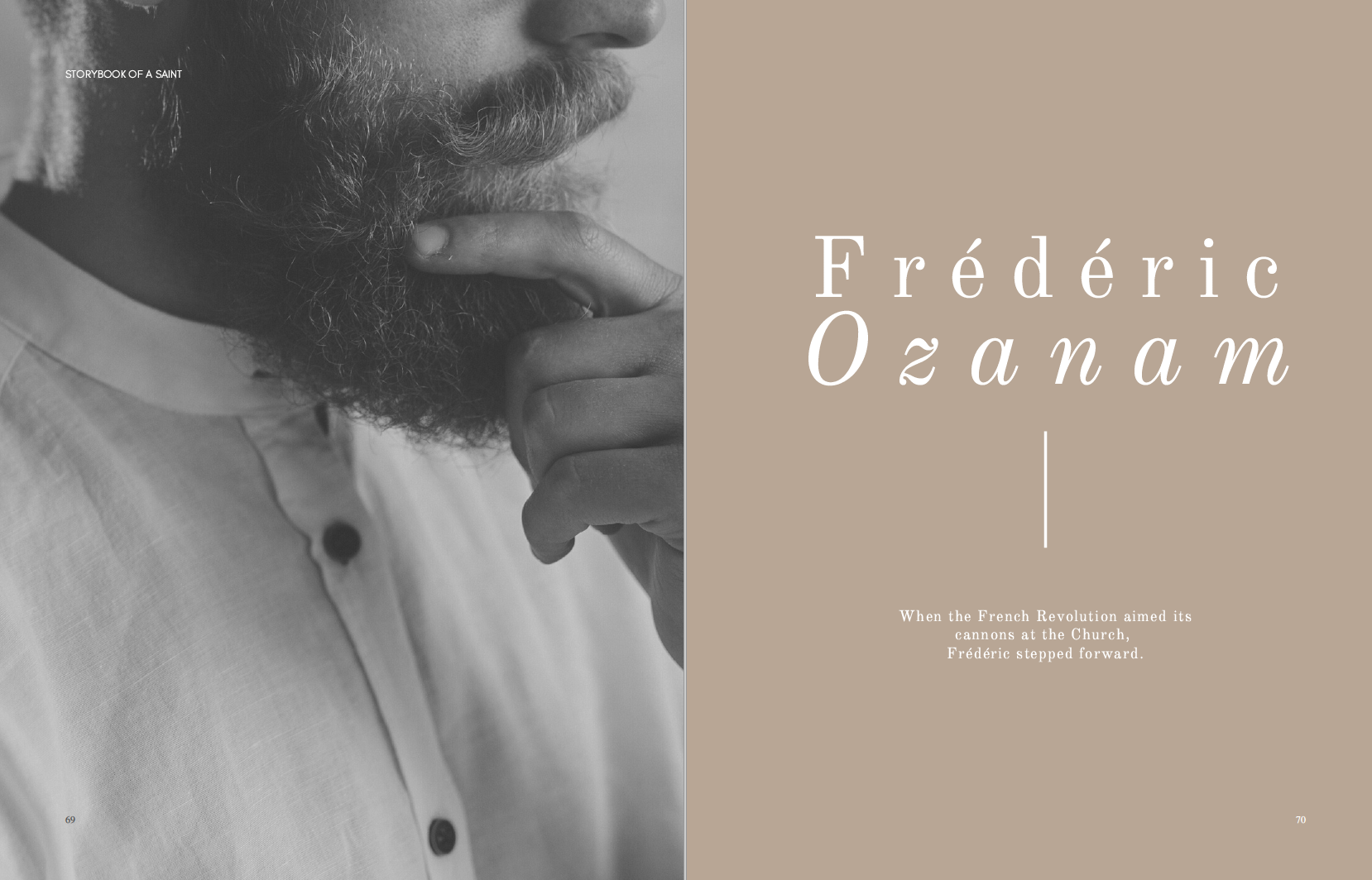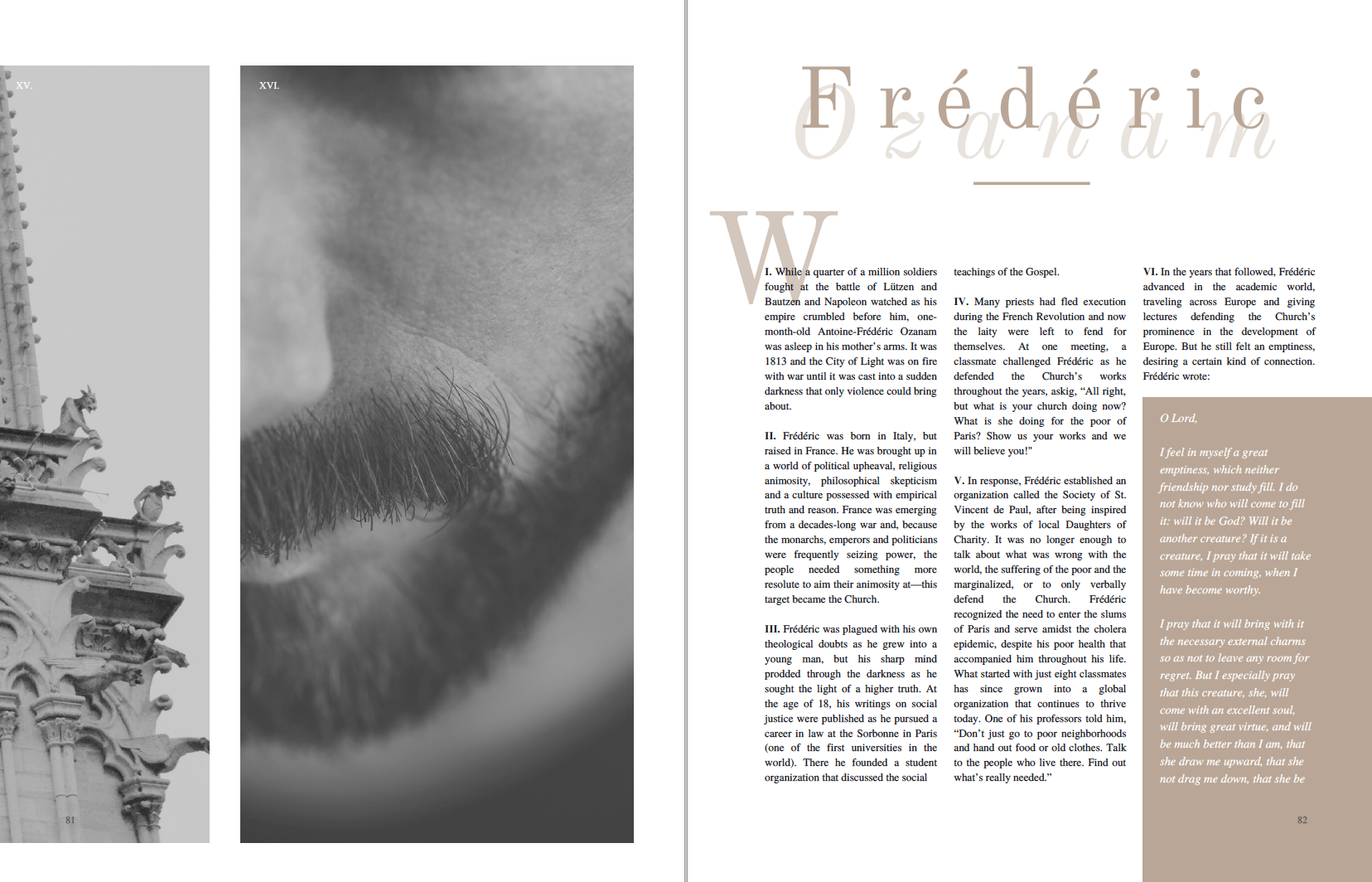This Man is the Saint We Need Today
When the French Revolution aimed its cannons at the Church, Frédéric stepped forward…
While a quarter of a million soldiers fought at the battle of Lützen and Bautzen and Napoleon watched as his empire crumbled before him, one-month-old Antoine-Frédéric Ozanam was asleep in his mother’s arms. It was 1813 and the City of Light was on fire with war until it was cast into a sudden darkness that only violence could bring about.
Frédéric was born in Italy, but raised in France. He was brought up in a world of political upheaval, religious animosity, philosophical skepticism and a culture possessed with empirical truth and reason. France was emerging from a decades-long war and, because the monarchs, emperors and politicians were frequently seizing power, the people needed something more resolute to aim their animosity at—this target became the Church.
Frédéric was plagued with his own theological doubts as he grew into a young man, but his sharp mind prodded through the darkness as he sought the light of a higher truth. At the age of 18, his writings on social justice were published as he pursued a career in law at the Sorbonne in Paris (one of the first universities in the world). There he founded a student organization that discussed the social teachings of the Gospel.
Many priests had fled execution during the French Revolution and now the laity were left to fend for themselves. At one meeting, a classmate challenged Frédéric as he defended the Church’s works throughout the years, asking, “All right, but what is your church doing now? What is she doing for the poor of Paris? Show us your works and we will believe you!"
In response, Frédéric established an organization called the Society of St. Vincent de Paul, after being inspired by the works of local Daughters of Charity. It was no longer enough to talk about what was wrong with the world, the suffering of the poor and the marginalized, or to only verbally defend the Church. Frédéric recognized the need to enter the slums of Paris and serve amidst the cholera epidemic, despite his poor health that accompanied him throughout his life. What started with just eight classmates has since grown into a global organization that continues to thrive today. One of his professors told him, “Don’t just go to poor neighborhoods and hand out food or old clothes. Talk to the people who live there. Find out what’s really needed.”
In the years that followed, Frédéric advanced in the academic world, traveling across Europe and giving lectures defending the Church’s prominence in the development of Europe. But he still felt an emptiness, desiring a certain kind of connection. Frédéric wrote:
O Lord,
I feel in myself a great emptiness, which neither friendship nor study fill. I do not know who will come to fill it: will it be God? Will it be another creature? If it is a creature, I pray that it will take some time in coming, when I have become worthy.
I pray that it will bring with it the necessary external charms so as not to leave any room for regret. But I especially pray that this creature, she, will come with an excellent soul, will bring great virtue, and will be much better than I am, that she draw me upward, that she not drag me down, that she be fervent because I am lukewarm in the things of God, and, finally, that she be compassionate so that I, in my inferiority, may not have to blush before her.
Do not forsake me, Lord. Grant that I may be loved. You know it is not only sweetness that I seek in Love; it is the contempt for all baseness, it is the strength to fight for the Good, for the True. Amen.
In 1841, at the age of 28, he was blindly set up with a young woman named Amélie Soulacroix and fell for her immediately. The first time he laid eyes on her, she was caring for her crippled brother with a tenderness that spoke to Frédéric’s heart of service. Before their wedding, Frédéric wrote to her: “I give you the will of a man, an upright and honest will, the will to be good so as to make you happy.” In remembrance of their wedding, he always gave his wife a bouquet of flowers on the 23rd of each month.
Pope John Paul II wrote of him, “Frédéric Ozanam believed in love, the love of God for every individual. He felt himself called to love, giving the example of a great love for God and others. He went to all those who needed to be loved more than others, those to whom the love of God could not be revealed effectively except through the love of another person. There Ozanam discovered his vocation, the path to which Christ called him. He found his road to sanctity.”



(Images left: layout from where this article originally appeared in the third issue of VIGIL)
After two miscarriages, Frédéric and Amélie were blessed with a daughter, Marie, in 1845. Frédéric wrote to a friend in August 1845, "After a succession of favors, yet another is added, probably the greatest we can have on earth: I am a father. "
With untamable hair and a fire in his eyes, Frédéric continued to serve the poor and defend the unpopular Church with Amélie by his side. As a professor, he was especially attentive to Catholic students navigating the liberal academia world.
Throughout France, though, the chasms only continued to deepen between academia and religion, the poor and the wealthy, truth and reason, so he continued to dedicate his life toward reconciling the differences. “The question which is agitating the world today is a social one. It is a struggle between those who have nothing and those who have too much. It is a violent clash of opulence and poverty which is shaking the ground under our feet. Our duty as Christians is to throw ourselves between these two camps in order to accomplish by love, what justice alone cannot do,” Frédéric wrote.
In 1848, Frédéric had no choice but to do just that when Paris turned their weapons inward and civil war broke out yet again. This time, Frédéric was drafted into the national guard. Ten thousand Parisians were slaughtered over the course of weeks and 267,000 lost their jobs.
In the midst of so much social depravity, Frédéric was dying. The Ozanam family retreated to a cottage by the sea in hopes of restoring his perpetually poor health, but no relief came.
One of his last acts, that drained him of his strength, was to assemble a bouquet for Amélie. He had sworn to never forget their monthly wedding anniversary, and he remembered and celebrated it until the end. But in his last moments, his final words were directed to his Greatest Love: "Ah, why should I fear Him? I love Him so."
As the gargoyles wept over a bloody Paris, and as Frédéric’s life slipped away, the Society of St. Vincent de Paul roared to life in response to the February Revolution of 1848. Frédéric’s life was over, but his legacy was just beginning. Today, the society is one of the largest international Catholic charity organizations. “It is full time God let light into this chaos," Frédéric had once prayed. “Let us complain less of our times and more of ourselves. Let us not be discouraged, let us be better.”
Pope Saint John Paul II beatified Blessed Frédéric Ozanam on World Youth Day in the Cathedral of Notre Dame on August 22, 1997 and called him “a precursor of the Catholic Church's social doctrine.” John Paul II continued, stating that it wasn’t until the Second Vatican Council that the role of the laity was fully realized (specifically laid out in Lumen Gentium); Frédéric, however, was “a lay witness to the faith, the anticipator of that profile of the lay Christian” over one hundred years before the role of the lay person was actualized. Most of his work was established in his twenties, echoing the sentiments of Blessed Pier Giorgio Frassati (another young Blessed who wasn’t to arrive for another 80 years) who posed the compelling question, “If the young won’t do it, then who will?”










